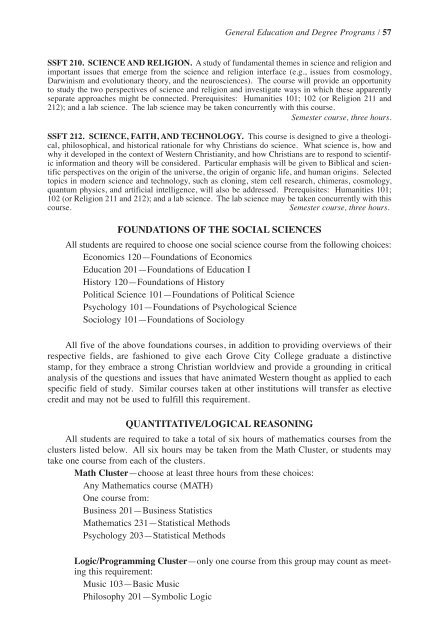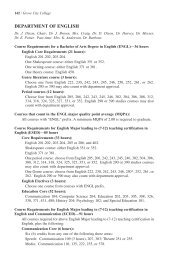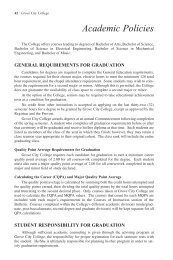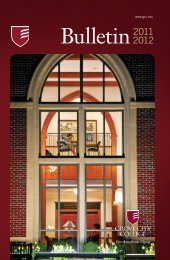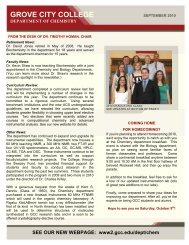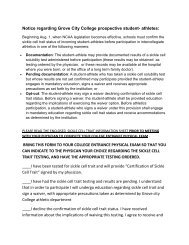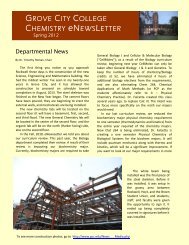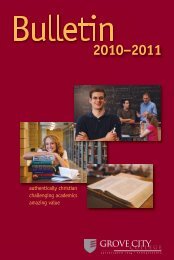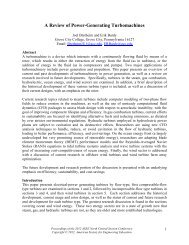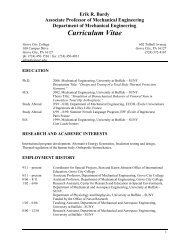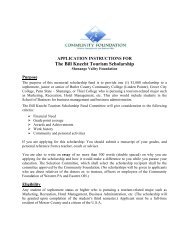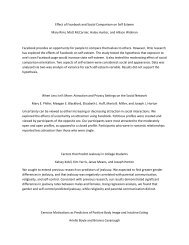2009–2010 - Grove City College
2009–2010 - Grove City College
2009–2010 - Grove City College
Create successful ePaper yourself
Turn your PDF publications into a flip-book with our unique Google optimized e-Paper software.
General Education and Degree Programs / 57<br />
SSFT 210. SCIENCE AND RELIGION. A study of fundamental themes in science and religion and<br />
important issues that emerge from the science and religion interface (e.g., issues from cosmology,<br />
Darwinism and evolutionary theory, and the neurosciences). The course will provide an opportunity<br />
to study the two perspectives of science and religion and investigate ways in which these apparently<br />
separate approaches might be connected. Prerequisites: Humanities 101; 102 (or Religion 211 and<br />
212); and a lab science. The lab science may be taken concurrently with this course.<br />
Semester course, three hours.<br />
SSFT 212. SCIENCE, FAITH, AND TECHNOLOGY. This course is designed to give a theological,<br />
philosophical, and historical rationale for why Christians do science. What science is, how and<br />
why it developed in the context of Western Christianity, and how Christians are to respond to scientific<br />
information and theory will be considered. Particular emphasis will be given to Biblical and scientific<br />
perspectives on the origin of the universe, the origin of organic life, and human origins. Selected<br />
topics in modern science and technology, such as cloning, stem cell research, chimeras, cosmology,<br />
quantum physics, and artificial intelligence, will also be addressed. Prerequisites: Humanities 101;<br />
102 (or Religion 211 and 212); and a lab science. The lab science may be taken concurrently with this<br />
course. Semester course, three hours.<br />
FOUNDATIONS OF THE SOCIAL SCIENCES<br />
All students are required to choose one social science course from the following choices:<br />
Economics 120—Foundations of Economics<br />
Education 201—Foundations of Education I<br />
History 120—Foundations of History<br />
Political Science 101—Foundations of Political Science<br />
Psychology 101—Foundations of Psychological Science<br />
Sociology 101—Foundations of Sociology<br />
All five of the above foundations courses, in addition to providing overviews of their<br />
respective fields, are fashioned to give each <strong>Grove</strong> <strong>City</strong> <strong>College</strong> graduate a distinctive<br />
stamp, for they embrace a strong Christian worldview and provide a grounding in critical<br />
analysis of the questions and issues that have animated Western thought as applied to each<br />
specific field of study. Similar courses taken at other institutions will transfer as elective<br />
credit and may not be used to fulfill this requirement.<br />
QUANTITATIVE/LOGICAL REASONING<br />
All students are required to take a total of six hours of mathematics courses from the<br />
clusters listed below. All six hours may be taken from the Math Cluster, or students may<br />
take one course from each of the clusters.<br />
Math Cluster—choose at least three hours from these choices:<br />
Any Mathematics course (MATH)<br />
One course from:<br />
Business 201—Business Statistics<br />
Mathematics 231—Statistical Methods<br />
Psychology 203—Statistical Methods<br />
Logic/Programming Cluster—only one course from this group may count as meeting<br />
this requirement:<br />
Music 103—Basic Music<br />
Philosophy 201—Symbolic Logic


